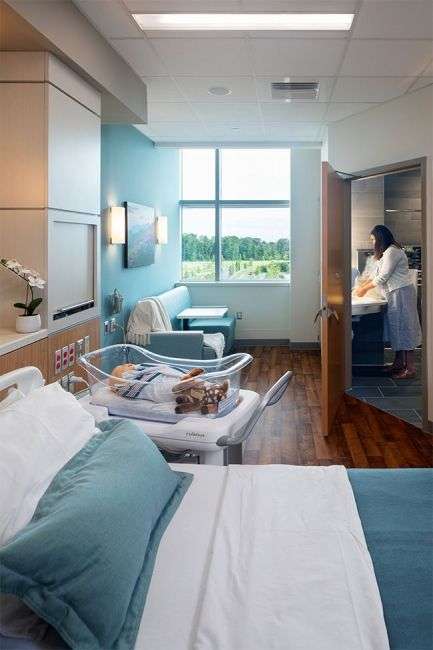
Empowering Healthcare Professionals: Hospertz’s Role in Your Growth
November 25, 2024
Accessing Healthcare in Rural Maharashtra: A Location Challenge
December 3, 2024As healthcare facilities continue to expand, it’s vital to reduce their environmental impact while maintaining the highest standards of care. Hospertz India Pvt Ltd is at the forefront of transforming hospital construction by implementing sustainable practices focusing on energy efficiency, renewable energy, and waste management. Here’s how these initiatives are revolutionizing healthcare campus design:
How Can Hospitals Improve Energy Efficiency?
Hospitals are major energy consumers due to their round-the-clock operations, complex medical equipment, and extensive HVAC needs. Hospertz India Pvt Ltd is helping healthcare facilities optimize energy usage through:
- High-Performance Materials: Insulated windows, thermal roofing, and energy-efficient HVAC systems significantly reduce energy consumption by improving insulation and minimizing heat loss.
- Smart Building Systems: Advanced systems that adjust lighting, heating, and cooling based on occupancy and real-time needs can help reduce unnecessary energy use while ensuring patient and staff comfort.
- Energy Modeling Tools: These tools assist architects and engineers in designing the most energy-efficient buildings by simulating energy flows and suggesting materials and layouts that minimize energy consumption.
Can Renewable Energy Power Healthcare Facilities?
Healthcare campuses can dramatically reduce their reliance on fossil fuels through renewable energy solutions. Hospertz India Pvt Ltd is guiding hospitals in integrating clean energy sources:
- Solar Panels: Rooftop and ground-mounted solar panels generate significant electricity, reducing grid reliance and lowering energy costs.
- Geothermal Heating & Cooling: Geothermal systems use the earth’s natural temperature to heat and cool buildings efficiently, reducing energy use and costs.
- Wind Turbines: In areas with sufficient wind, small-scale wind turbines can supplement solar power and further reduce fossil fuel dependence.
- Energy Storage Systems: Hospitals can store excess renewable energy for peak times, reducing grid reliance and stabilizing costs.

How Can Hospitals Manage Water and Waste More Effectively?
Water and waste management are crucial components of sustainable hospital design. Hospertz India Pvt Ltd supports hospitals in implementing efficient resource management strategies:
- Water-Efficient Fixtures: Low-flow faucets, toilets, and showers can significantly reduce water consumption in hospitals, typically high-water-use facilities.
- Greywater Recycling & Rainwater Harvesting: Reusing water for irrigation, cooling, and toilets reduces water demand and eases the strain on local systems.
- Eco-Friendly Waste Management: Hospitals can reduce landfill waste through comprehensive recycling, composting organic materials, and using environmentally responsible building materials. This approach not only minimizes waste but also promotes sustainability in hospital operations.
What Are the Environmental Benefits of Sustainable Hospital Design?
Sustainable hospital design offers numerous environmental advantages that improve both patient care and the surrounding community:
- Reduced Carbon Emissions: Energy-efficient buildings powered by renewable energy reduce a hospital’s carbon footprint, helping mitigate climate change.
- Improved Indoor Air Quality: Non-toxic materials and improved ventilation create healthier indoor environments for patients and staff.
- Green Spaces & Biodiversity: Gardens, green roofs, and landscaping improve patient well-being, support biodiversity, enhance air quality, and aid stormwater management.
What Financial Benefits Come with Sustainable Healthcare Construction?
Although the initial investment in sustainable healthcare construction may be higher, the long-term financial benefits are substantial:
- Energy Cost Savings: Hospitals can lower energy costs by reducing consumption through energy-efficient designs and renewable energy systems. Over time, these savings offset the upfront construction costs.
- Government Incentives: Many governments offer tax credits, rebates, and grants to encourage adopting green building practices, which can significantly reduce the overall investment required for sustainable projects.
- Operational Cost Reductions: Hospitals can reduce ongoing operational costs by implementing smart building systems and resource-efficient technologies, leading to long-term financial savings.

Is Certification Important for Sustainable Healthcare Design?
Certification programs like LEED (Leadership in Energy and Environmental Design) can play an important role in demonstrating a hospital’s commitment to sustainability:
- LEED Certification: Hospitals with LEED certification can showcase their dedication to environmental responsibility, meeting rigorous standards for energy use, water efficiency, and sustainable material selection.
- Attracting Eco-Conscious Stakeholders: Achieving sustainability certifications can enhance a hospital’s reputation, attracting eco-conscious patients, staff, and investors who prioritize green practices.
In Conclusion: Why Sustainable Construction Matters for Healthcare Facilities
Embracing sustainable construction practices offers healthcare facilities a range of benefits. By incorporating energy-efficient systems, renewable energy sources, and responsible resource management, hospitals can reduce their environmental footprint, improve patient care, and save money in the long run. Hospertz India Pvt Ltd is committed to guiding healthcare providers through this transformation, creating green, sustainable campuses that benefit both the environment and the community.
The future of healthcare construction is green, and it’s time to build for a healthier planet. Let Hospertz India Pvt Ltd help you create a sustainable, efficient, and future-ready healthcare facility.
Dr. Vishal Jadhav, Director
hospertz@gmail.com
+91 9867712705/ 9820833149


